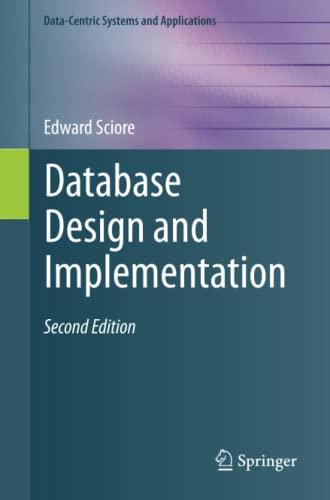Question
This is part of a simple Round Robin Scheduler I am working on for an OS assignment. It begins scheduling the processes correctly, but towards
This is part of a simple Round Robin Scheduler I am working on for an OS assignment. It begins scheduling the processes correctly, but towards the end does not match the desired output. Can someone point out the flaw in my logic without giving too much away? Thank you
#include "schedule.h"
#include
#include
/**
* Function to initialize any global variables for the scheduler.
*/
struct node{
PCB* proc;
struct node* next;
};
struct node* root;
struct node* cur;
void init(){
root=NULL;
cur = root;
}
/**
* Function to add a process to the scheduler
* @Param process - Pointer to the process control block for the process that
* needs to be scheduled. PCB is defined in the header.
* @return true/false response for if the addition was successful
*/
int addProcess(PCB* process){
if(root==NULL){
root = (struct node*) malloc( sizeof(struct node));
cur = root;
}
else{
cur->next = (struct node*) malloc( sizeof(struct node));
cur = cur->next;
}
cur->proc = process;
return 0;
}
/**
* Function to get the next process from the scheduler
* @Param time - pass by reference variable to store the quanta of time
* the scheduled process should run for
* @Return returns pointer to process control block that needs to be executed
* returns NULL if there is no process to be scheduled.
*/
PCB* nextProcess(int *time){
cur=root;
*time=4;
if(cur!=NULL){
PCB* temp_proc;
temp_proc=cur->proc;
cur=root;
if(root->next!=NULL)
root=root->next;
else
root=NULL;
free(cur);
return temp_proc;
}
else
return NULL;
}
/**
* Function that returns a boolean 1 True/0 False based on if there are any
* processes still scheduled
* @Return 1 if there are processes still scheduled 0 if there are no more
* scheduled processes
*/
int hasProcess(){
if(root==NULL)
return 0;
else
return 1;
}
//----------------second file w/ main func--------------
#include #include #include #include #include #include #include #include
#include "schedule.h"
// // main - The simulator's main routine // int main(int argc, char **argv){ int processes[10]; init(); int i; for(i=0;i<10;i++){ processes[i]=100; printf("Scheduled Process: %d ", i); PCB* proc = (PCB *) malloc(sizeof(PCB)); proc->pid = i; proc->priority=0; addProcess(proc); }
PCB* process = NULL; int time = 0; while(hasProcess()){ process = nextProcess(&time); if(!process){ printf("NULL Process, something went wrong in your code. "); exit(1); } for(;time>0;time--){ printf("Process %d executed ", process->pid); processes[process->pid]--; if(processes[process->pid]<0){ printf("Process %d Finished ", process->pid); break; } } if(processes[process->pid]>=0){ addProcess(process); } }
exit(0); //control never reaches here }
Step by Step Solution
There are 3 Steps involved in it
Step: 1

Get Instant Access to Expert-Tailored Solutions
See step-by-step solutions with expert insights and AI powered tools for academic success
Step: 2

Step: 3

Ace Your Homework with AI
Get the answers you need in no time with our AI-driven, step-by-step assistance
Get Started


